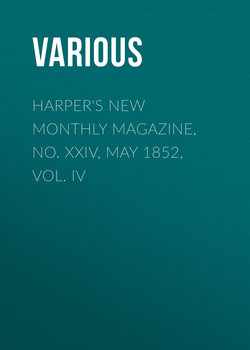Читать книгу Harper's New Monthly Magazine, No. XXIV, May 1852, Vol. IV - Various - Страница 10
THE BEDOUEEN, MOHAMMAD ALEE, AND THE BAZAARS. 5
BAZAARS
ОглавлениеChristians and Saracens agree in reprobating the black hat. But the Damascenes declare open war against it. In 1432, Bertrandon de la Brocquière entered the city with a "broad beaver hat," which was incontinently knocked off his head. Naturally his first movement was "to lift my fist," but wisdom held his hand, and he desisted, content to revenge himself by the questionable inference that it was "a wicked race."
But if it be "wicked" to malign the black hat, who shall be justified?
This was only a gentle illustration of the bitter hatred of Christians and all infidels, cherished by the Damascenes, who are the most orthodox of Muslim. Indeed, it is only within twenty years that an accredited English representative could reside in Damascus, and he maintains an imposing state. At present, some hundred European tourists visit the city yearly, and the devout faithful find reasons for toleration in infidel gold, which they never found in argument.
Here, too, as every where in Syria, Ibrahim Pacha has been our ally. He permitted infidels to ride horses through the streets. "O, Allah!" exclaimed the religious Damascenes, who are termed by the Turks Shami-Shoumi, cursed rascals. "Your Highness suffers Christians to sit as high as the faithful."
"No, my friends," responded Ibrahim, "you shall ride dromedaries, which will put you much above them."
We went into the bazaars to encounter these enemies of the black hat, and ex-officio riders of dromedaries. We had a glimpse of their beauty as we entered the city. But Eastern life is delightful in detail. It is a mosaic to be closely studied.
You enter, and the murmurous silence blends pleasantly with the luminous dimness of the place. The matting overhead, torn and hanging in strips along which, gilding them in passing, the sun slides into the interior, is a heavy tapestry. The scene is a perpetual fair, not precisely like Greenwich Fair, or that of the American Institute, but such as you frequent in Arabian stories.
Bedoueen glide spectrally along, with wild, roving eyes, like startled deer. Insane Dervishes and Santons meditate the propriety of braining the infidel Howadji. Shekhs from distant Asia, pompous Effendi from Constantinople, Bagdad traders, cunning-eyed Armenian merchants meet and mingle, and many of our old friends, the grizzly-bearded, red-eyed fire-worshipers, somnolently curled among their goods, eye us, through the smoke they emit, as perfect specimens of the proper sacrifice they owe their Deity. All strange forms jostle and crowd in passing, except those which are familiar; and children more beautiful than any in the East, play in the living mazes of the crowd.
Shopping goes actively on. The merchant without uncrossing his legs, exhibits his silks and coarse cottons to the long draped and vailed figures that group picturesquely about his niche. Your eye seizes the bright effect of all the gay goods as you saunter on. Here a merchant lays by his chibouque and drinks, from a carved glass, sweet liquorice water, cooled with snow from Lebanon. Here one closes his niche and shuffles off to the mosque, followed by his boy-slave with the chibouque. Here another rises, and bows, and falls, kissing the floor, and muttering the noon prayer. Every where there is intense but languid life.
The bazaars are separated into kinds. That of the jewelers is inclosed, and you see the Jews, swarthy and keen-eyed servants of Mammon, busily at work. Precious stones miserably set, and handfuls of pearls, opals, and turquoises are quietly presented to your inspection. There is no eagerness of traffic. A boy tranquilly hands you a ring, and another, when you have looked at the first. You say "la," no, and he retires.
Or you pause over a clumsy silver ring, with an Arabic inscription upon the flint set in it. Golden Sleeve ascertains that it is the cipher of Hafiz. You reflect that it is silver, which is the orthodox metal, the Prophet having forbidden gold. You place it upon your finger, with the stone upon the inside, for so the Prophet wore his upon the fore-finger, that he might avoid ostentation. It is a quaint, characteristic, oriental signet-ring. Hafiz is a common name, it is probably that of the jeweler who owns the ring. But you have other associations with the name, and as you remember the Persian poet, you suffer it to remain upon your finger, and pay the jeweler a few piastres. You do not dream that it is enchanted. You do not know that you have bought Ala-ed-deen's lamp, and as a rub of that evoked omnipotent spirits, so a glance at your ring, when Damascus has become a dream, will restore you again to the dim bazaar, and the soft eyes of the children that watch you curiously as you hesitate, and to the sweet inspiration of Syria.
